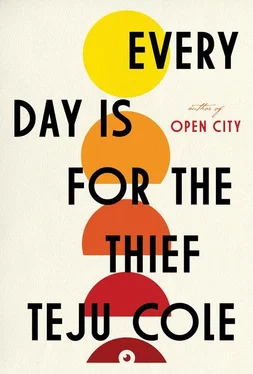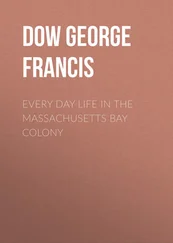Money for nothing. Uncle Tunde is infuriated and he, too, starts pacing near the Civic. The men who have been sent to pacify the area boys come back to us.
— We gave them five hundred, sir. They are asking for more. They say they want fifteen thousand.
More than one hundred dollars, just for walking through the gate. My aunt has no intention of paying, as she has already spent too much on clearing the goods. Her friend agrees with her. And, in any case, no one has that kind of ready money. The area boys can see us deliberating. They start shouting.
— What if we had met you out on the roads? There’s no telling. We could have killed you!
— Yes, you’re lucky we are here only. Is it too much to ask that you share the wealth? Nobody leaves this field until we are satisfied. You hear that? You hear that? Nobody leaves. We’ll do whatever we have to do.
— That’s right. We’ll rip open these boxes and take our share. We will become rich today. We might even take the car. It’s a nice car! Or if we don’t take it, we can smash the windscreen.
We are silent. They move closer. Their eyes are bloodshot, their chests stuck out. There is tension in the air, a tension in the divide between our bewildered silence and their complete lack of inhibition. Let them open some boxes, my aunt says in a low and angry voice, maybe they are really into books. We outnumber them almost three to one, counting only the men in our group. And the area boys aren’t particularly impressive in stature. But it makes no difference. They are primed to maim or kill as the spirit moves them while, on our side, we have ordinary people who have only the normal instinct for safety. Uncle Tunde says to Mr. Wuraola:
— Can we call the police? I have a phone, let us call the police.
— It’s no use. The police will come, sure, but they in their turn will ask for thirty thousand. We’ll have to pay double. But don’t worry. These guys can’t do anything. They are just posing.
I am not so sure. The area boys strut around. They continue shouting. The drivers, desperate to calm them down, go over and give them another five hundred naira. They take it but renew their demand for the fifteen grand. The tension builds, minute gives way to minute. A quarter of an hour goes by. The area boys stop shouting but they continue to pace around the field, eyeing the boxes and the Civic. For some reason, they don’t come right up to where we stand. They simply trace a semicircle around us, the perimeter of which they walk back and forth. Something in their movement brings to mind hyenas keeping their distance from a carcass.
We are unsettled. My aunt sits in one of the vans, holds her head in her hand, and quietly begins to cry. I feel like a tuning fork, vibrating with an unfamiliar will to violence. There is nowhere to run to and I have no desire to run. I can no longer bear the violation, the caprice, the air of desperation. If they attack, I say to myself, I will crush their throats. I think of myself as a pacifist, but what I want now is to draw blood, to injure, even to be injured. Crazed by the situation and by the need for an end to it, I no longer know myself.
And then, as suddenly as they appeared, they leave. They shake their forearms at us, turn around, and head for the gate. We stand stock-still as they open the gate, step out, and close it behind them. The sky darkens rapidly over Surulere. My uncle says:
— Will they come back? Will they wait outside for us?
— Don’t worry about it, Mr. Wuraola says. Empty threats. But you know, it would be wise to leave the car here tonight. It’s safe in the school compound. Come back and pick it up in a few days. They won’t bother us again. They’ll take some money from the trailer driver when he leaves, but not too much. He knows it is part of his expense.
We all work at double pace to finish loading the vans. Nobody can avoid the thought that one of the four vans might be waylaid on the way. We agree to drive in tight convoy. My uncle and my aunt enter one of the vans, and I another. I feel sad. This is life too close to the edge of danger for me. It is too severe a tax on the right to private property.
Night falls. The convoy streams out of the school. Each driver nervously looks right and left as we move through Surulere and onto Western Avenue. Finally, out on the open road, we relax. The traffic thickens at Ikorodu Road and we lose sight of each other. The van in which I am riding selects an unfortunate route — we run into a total standstill at Anthony and yet another on Allen Avenue. The fight lies sleeping like a snake in my veins. We do not arrive at Ojodu until two hours after the others.
“One can’t say it aloud, but there is a lot of repressed violence here. That is why the furnishings seem so heavy. And why it is so difficult to see the other thing present: a spot of sun that moves over the house walls and slips over the unaware forest of flickering faces, a biblical saying never set down: ‘Come unto me, for I am as full of contradictions as you.’ ”
I pretend for a moment that these lines of Tomas Tranströmer’s were written with Nigeria in mind. It is not hard to see how they fit our situation. The contradictions he writes about are the contradictions of poetry, the voice that says: maybe this, maybe that, maybe something else. But in an atmosphere in which the past has been erased, contradictions are forbidden. The typical middle-class Nigerian living room is a dark space. Anchored with weighty upholstery and veiled in thick curtains that banish all light, it announces to all visitors that the household is prosperous. The windows are never opened, the furniture has to be immovable. These are the rules. What is this place? A cipher enclosed within a riddle.
It is late morning, a Wednesday. I wander around old Lagos. There was a brief, sudden shower earlier in the day, the only rain I have seen in these harmattan weeks of my journey. As the downpour began, the congested streets opened up as people fled from one spot to another. The rain in Lagos takes everyone by surprise, regardless of season. The bright heat has now returned. At the artery of the CMS junction, which is always dense with rapidly moving human bodies, my mind makes a heavy and unexpected connection: the secret twinship this city has with another, thousands of miles away. The thought is of the chain of corpses stretching across the Atlantic Ocean to connect Lagos with New Orleans. New Orleans was the largest market for human chattel in the New World. There were twenty-five different slave markets in the city in 1850. This is a secret only because no one wants to know about it. It was at those markets that buyers came to bid on the black men and women who had survived the crossing, but that is a history that is now literally submerged. Actually, it was submerged long before the recent flood, the city’s slaving past drowned in drink and jazz and Mardi Gras. High times: the best cure for history. The human cargo that ended up in New Orleans originated from many ports, most of them along the West African shore. And here was another secret: none of those ports was busier than Lagos.
The fratricidal Yoruba wars of the eighteenth and early nineteenth centuries were a great boost to the transatlantic traffic in human beings. There were constant skirmishes between the Ijebus, the Egbas, the Ekitis, the Oyos, the Ibadans, and many other Yoruba groups. Some of the smaller groups might even have been wiped out from history, as the larger ones enlarged their territory and consolidated their power. The vanquished were brought from the interior to the coast and sold to the people of Lagos and to communities along the network of lagoons stretching westward to Ouidah. And they in turn arranged the auctions at which the English, the Portuguese, and the Spanish loaded up their barracoons and slave ships. Some of these intertribal wars were waged for the express purpose of supplying slaves to traders. At thirty-five British pounds for each healthy adult male, it was a lucrative business.
Читать дальше












